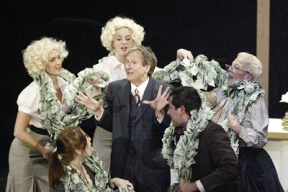The musical satire ‘Urinetown’ opens on the BPA mainstage.
Lest anyone leave the theater scratching their head, a note on the final, curtain-dropping gag in “Urinetown: The Musical” is perhaps in order.
It’s a reference to Thomas Robert Malthus, an 18th century English demographer who theorized that human population would inevitably outpace the natural resources upon which it relies, leading to great starvation, catastrophe and woe. You might think of it as a pre-Darwinian take on natural selection, or to really strain a pun, Mother Nature’s process of elimination – which brings us back around to “Urinetown’s” central concern.
“A most basic need – everybody’s gotta do it,” said Teresa Thuman, who directs the Bainbridge Performing Arts production of a by-turns silly, cynical and smirkingly titled musical that opens on the mainstage this week.
So, for those who think the musical might be a play on the phrase “You’re In Town”….no. It is in fact about pee. Piddle. Weewee. Tinkle. Whiz. But as the Malthusian reference suggests, it also confronts issues less passing.
In a dystopian not-too-distant future, a community finds itself parched by a 20-year drought. Facing acute water shortages, the community rations the precious stuff not as it goes in, but rather as it goes out. Private toilets have been outlawed, and relief comes only at public restrooms where lengthy and knee-buckling queues are the norm.
Conservation is enforced by the sinister corporation Urine Good Company and its corrupt CEO, Caldwell B. Cladwell. You pay to pee – or you’re shipped off to a penal colony called Urinetown, never to return.
This social order is maintained until one day Old Man Strong, too poor to pay for admission to the wretched Public Amenity No. 9, relieves himself in the street. The defiant man is hauled off to his punishment, but in that single act – and another urinal fee hike – the seeds of revolution are sown.
Rebels led by the dashing young Bobby Strong kidnap Cladwell’s winsome daughter Hope and take refuge in (where else) the sewers, threatening to dispatch the hapless girl unless the company accedes to their demand: to pee for free.
Romance ensues, and great heroism, much song and more than a little mayhem as “Urinetown” skewers musical conventions including the standard sanguine ending. Hail Malthus, indeed.
“The target of it all is superficially false optimism, which I think of as a social problem,” Thuman said. “We get a lot of false optimism coming from above, and not a lot of fact or truth. I think the twists and turns at the end bring that into sharp focus.”
For the relentlessness of the satire, islanders may find some distinct parallels to their own time and community. “Future water shortage” is the current mantra of local no-growthers, while the saga of the Waterfront Park restroom has provided high camp for years now.
It is said that playwright Greg Kotis was inspired by nothing more dramatic than a visit to a pay toilet while traveling in Europe. The play debut at the New York Fringe Festival but quickly worked its way to Broadway in 2001, earning three Tony Awards and six more nominations during a 965-performance run. The New York Times described it as a “marvelously self-conscious satire of the musical theater’s social conscience.”
The BPA production sees Luke Walker as Bobby Strong, leader of the rebel clan, and Michelle Lorenz Odell as Hope Cladwell. Maribeth Hinderer, late of BPA’s “Sisters Rosensweig,” returns as Penelope Pennywise, a restroom attendant with a secret, while BPA veteran Tim Tully takes a villainous turn as Caldwell B. Cladwell. A small orchestral ensemble backs the company through some 20 original numbers that send up everything from “Annie” to “Les Misrables to “West Side Story” to “Chicago.”
Add to that bureaucracy, resource management, small-town politics – they all get a good dousing in “Urinetown.” Not that it dwells on the scatalogical.
“The potty jokes are pretty much gone a third of the way through the show, and you’re into something completely different,” Thuman said. “It’s more about a drought and water than it is about peeing.”



